NHI eliminating 90-day wait for patients to join



By NEIL HARTNELL Tribune Business Editor nhartnell@tribunemedia.net
By NEIL HARTNELL Tribune Business Editor nhartnell@tribunemedia.net
THE National Health Insurance (NHI) Authority will today eliminate restrictions on Bahamians enrolling in the scheme in a move branded as “damn the torpedos” by an exhealth minister.
Dr Duane Sands, the Opposition’s chairman, speaking out as the Authority removes the extra 90-day wait persons must endure before they can join NHI, challenged how the Governmentfunded healthcare scheme will be able to “pay for” the increased patients - and associated higher costswhen it was unable to stay within its $46.2m budget for the 2024-2025 fiscal year. Describing the NHI Authority’s announcement of the changes as “a fascinating missive”, he argued that ending this curb - as well as eliminating the current cap on the number of doctors and other medical professionals providing services to the scheme on New Providence - “makes absolutely no sense financially”.
And Dr Sands, who was minister of health under
the Minnis administration, told this newspaper that it appeared the Government has decided “blowing a hole in the Public Treasury” is its route to securing general election success given NHI’s need for extra taxpayer funding to pay its bills prior to yesterday’s 2024-2025 fiscal year-end close.
However, Dr Michael Darville, minister of health and wellness, told Tribune Business that “for the first time since its inception NHI is bringing the public [sector] clinics on” as a way for the Government to retain some of its expenditure. The revenues the clinics will earn from providing laboratory and diagnostic services to NHI patients, he explained, will now be retained by the Government.
And, as a result, the minister asserted that these monies will be reinvested in further upgrading the Department of Public Health’s clinics as well as financing the enrollment of more Bahamians to NHI and the scheme’s expansion. This, Dr Darville explained, will ensure NHI
SEE PAGE B5

A CABINET minister last night revealed that incorporating the public clinics into National Health Insurance (NHI) will ensure the scheme’s sustainability by enabling the Government to retain some expenditure.
Dr Michael Darville, minister of health and wellness, told Tribune Business
that using the Department of Public Health’s clinics to provide laboratory and diagnostics services to NHI patients will enable them to generate revenue income that will be deposited into the Government’s consolidated fund.
And, instead of being used to cover the Government’s other expenses, he pledged that this revenue will instead be reinvested in upgrading The Bahamas’ public health clinics,
expanding NHI and enrolling more Bahamians in the scheme to ensure better healthcare outcomes.
Disclosing that this is “the first time” the public healthcare system is becoming involved with, and integrated into, NHI, Dr Darville told this newspaper the move will ensure the Governmentrun network is no longer “left behind” and that the


By NEIL HARTNELL Tribune Business Editor nhartnell@tribunemedia.net
THE Association of Bahamas Marinas (ABM) chief yesterday voiced concern that key boating reforms cannot be accessed and paid online, adding: “It’s hard to believe they could mess it up this bad.”
Peter Maury, speaking after an Internet call between Customs and
in May with total departures from the country’s main aviation gateway down 2.3 percent for 2025 to-date.
The banking sector regulator, unveiling its report on May’s economic developments, again blamed “capacity constraints” - meaning a shortage of hotel rooms and other stopover accommodation - for the “slower pace” of year-over-year tourism arrivals despite concerns this may also be linked to reduced demand and global economic and political uncertainties.
In particular, the Central Bank noted that total and US departures through Lynden Pindling International Airport (LPIA), the primary point of entry for stopover visitors, were down yearover-year for both May and the first five months of 2025.
“Preliminary indications are that the domestic economy’s pace of growth moderated during May 2025, relative to the same period last year, as performance continued to move closer to their expected medium-term potential. Tourism inflows, although
the Bahamian maritime industry to discuss implementation of the Customs Management (Amendment) Regulations 2025, which are due to take effect today, told Tribune Business that neither the new frequent digital cruising card, nor the fishing permit and anchorage fees, are presently accessible or can be paid for online. Suggesting that the reforms will likely be “a little confusing” for visiting
at healthy levels, rose at a slower pace, owing to capacity constraints in the high value-added stopover category, albeit the cruise sector remained buoyant,” it added.
“Initial data indicated that, during the review month, tourism sector earnings slowed as activity in the stopover segment remained constrained by accommodation capacity. However, the cruise segment maintained its healthy pace of growth.
“Preliminary data from the Nassau Airport Development Company (NAD) revealed that total departures - net of domestic passengersdeclined by 3.2 percent to 133,397 in May relative to the same 2024 period.
Underlying this outcome, US departures fell by 3.7 percent to 113,984, and non-US international departures by 0.6 percent to 19,413 vis-à- vis the corresponding period last year,” the Central Bank said.
“On a year-to-date basis, total outbound traffic decreased by 2.3 percent to 700,000.
boats and yachts, he added that besides not yet being available on Customs Click2Clear website all three of the new permits and fees have to be paid for separately through visiting one of the Department’s offices. The ABM chief told this newspaper that the reforms, and how they are being introduced at short notice and with no industry consultation, appeared “designed to frustrate people” and drive a lucrative, high-spending market away from The Bahamas to visit other destinations. And he reiterated previous projections that this nation
By ANNELIA NIXON
HARBOUR Island resorts yesterday said they are “trying to control the narrative as best as possible with our guests” after the popular tourism destination was hit by more power outages.
Henry Rolle, managing partner of The Rock House, said Bahamas Power & Light’s woes have become progressively worse since “at least since May”, resulting in one of the resort’s generators going out of service.
“It’s bad,” Mr Rolle said. “It’s very bad. We’re lucky we have a generator. But the thing is, we actually had two. The first one got blown because of the issues. The thing is the power plant here, depending on the time of day, the voltage is never even on the island.
“So our property received high voltage and low voltage. So it would fluctuate between at least
five times a minute. And then there was this big surge that came through that just blew out our alternator for the main generator. That’s the generator, plus the transfer switch, plus the labour. That was about a $50,000 expense.” Mr Rolle said he was also given a number and an e-mail to report the damage but added: “Honestly, in terms of what they’re offering, it doesn’t come close to helping.”
Lee Prosenjak, Valentine’s Resort and Marina’s managing director, said: “I won’t hold my breath until I get reimbursed” regarding two bar refrigerators the resort has lost due to the outages and brownouts. He said he is currently keeping refreshments cool with the use of coolers.
“There’s a form to fill out when stuff happens that they give us a link to,” Mr Prosenjak said. “But I won’t hold my breath until I get reimbursed. The refrigeration equipment itself is $6,000; well, each of them. So it’s about $10,000 worth

THE Bahamas and Jamaica met recently to devise tourism sales and marketing strategies that will deepen regional ties and redefine intra-Caribbean travel.
The multi-day meeting brought top executives from the Jamaica Tourist Board, including marketing, sales, public relations and project management heads, together with their local counterparts for an event that showcased The Bahamas’ diverse tourism offerings.
Activities included travel agency visits; hotel site inspections at properties such as Atlantis, Baha Mar and Warwick Paradise Island; a Nassau city tour; and an excursion to Exuma. It finished with a press conference that featured Dr Kenneth Romer, director of aviation and deputy director-general of tourism; Tanya Pratt, chairman, Bahamasair; Shevonn Cambridge, deputy managing director, Bahamasair; Philip Rose, deputy director of tourism (USA), Jamaica
Tourist Board; and Peter Mullings, deputy director of marketing, Jamaica Tourist Board.
Dr Romer hailed the success of Bahamasair’s Nassau to Montego Bay route, which has exceeded projections since its launch.
He called the partnership “a bridge between cultures and a gateway to multi-destination Caribbean travel”, and emphasised the broader impact of such ventures, including cultural exchanges and tourism-driven economic growth across the region.
Ms Pratt added: “The Caribbean is strongest when we move forward together. This isn’t just a visit; it’s a celebration of shared values, family and vision. What we’re building today will have lasting ripple effects.”
Mr Cambridge, meanwhile, affirmed that airlift is “not just about transportation, it’s about connection”. He thanked the JTB for its trust and collaboration in shaping a new model of regional partnership.

AIRLIFT connectivity to The Bahamas has received a further boost in the wake of Silver Airways’ demise through another carrier’s move to offer service between Fort Lauderdale and Marsh Harbour.
The Ministry of Tourism, Investments and Aviation, in a statement, said Aztec Airways will this month expand its routes by operating daily flights between its private terminal at Fort Lauderdale–Hollywood International Airport and Leonard M. Thompson International Airport.
It added that the new route “underscores the growing demand for accessible and efficient travel options within the region, and the Ministry’s commitment to
improving connectivity and supporting local tourism”.
“We are delighted by Aztec Airways’ decision to expand their service, offering daily flights between Fort Lauderdale and Abaco,” said Chester Cooper, deputy prime minister and minister of tourism, investments and aviation.
“This direct, consistent service will not only streamline travel for our guests but also serves as a powerful catalyst for our local economy, fostering more tourism and investment opportunities in Abaco. We warmly welcome this enhanced partnership, which truly elevates the traveller experience.”
“Our latest campaign proudly declares: ‘It’s not one island, it’s a lifetime of them’, a message
designed to inspire visitors to fully embrace the unparalleled diversity of experiences The Bahamas offers,” said Latia Duncombe, director-general of tourism.
“Aztec Airways’ expanded service will now enable even more travellers to discover the unique beauty of The Abacos, including its world-renowned fishing and exceptional boating opportunities, making it easier than ever to begin that lifetime of Bahamian adventures.”
Travellers flying with Aztec Airways from its private terminal at Fort Lauderdale enjoy free parking, bypassing Transportation Security Administration (TSA) lines, swift check-ins and boarding in under 60 seconds.

For the JTB, Mr Rose called the initiative “what forward-thinking collaboration looks like”, and described the visit as a celebration of two nations committed to elevating not just their individual brands but the Caribbean as a whole. He said: “This is bigger than flights. It’s about building bridges, sparking cultural exchange and inviting the world to experience the magic of two iconic Caribbean destinations.”
The event closed with a cocktail reception at 1er Cru. Bahamasair and the JTB confirmed plans to launch joint marketing campaigns targeting not only regional travellers but also long-haul international visitors seeking immersive, multi-island Caribbean experiences.
These initiatives will include social media activations, influencer partnerships and curated travel packages designed to position The Bahamas and Jamaica as a unified, worldclass tourism package.
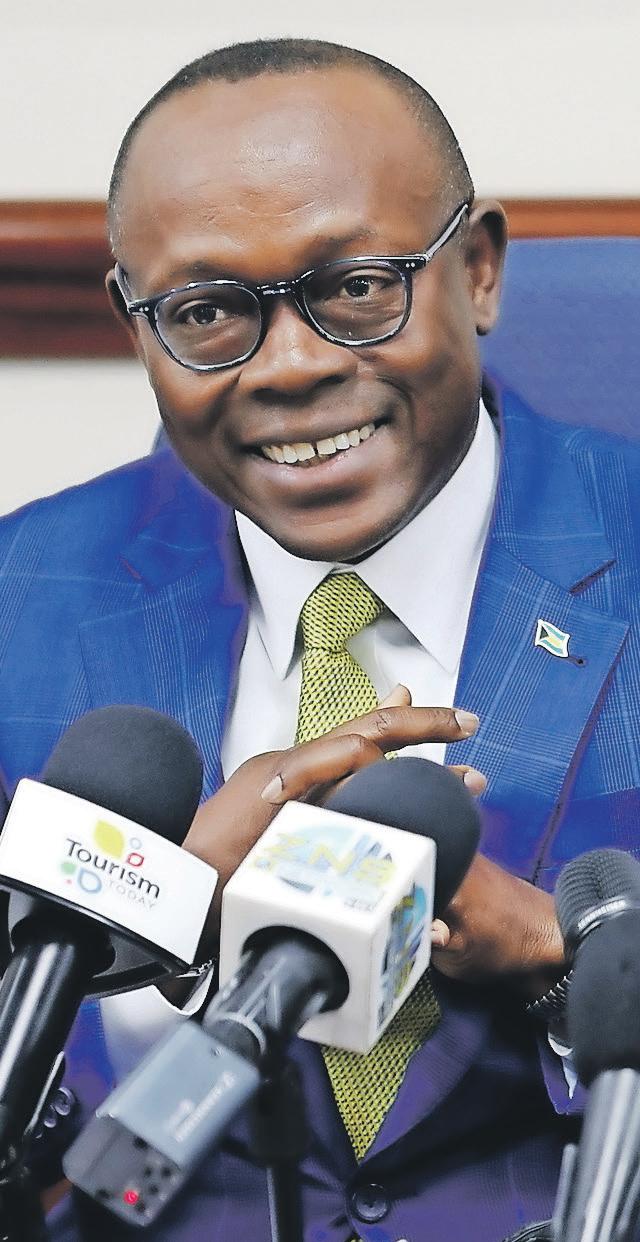
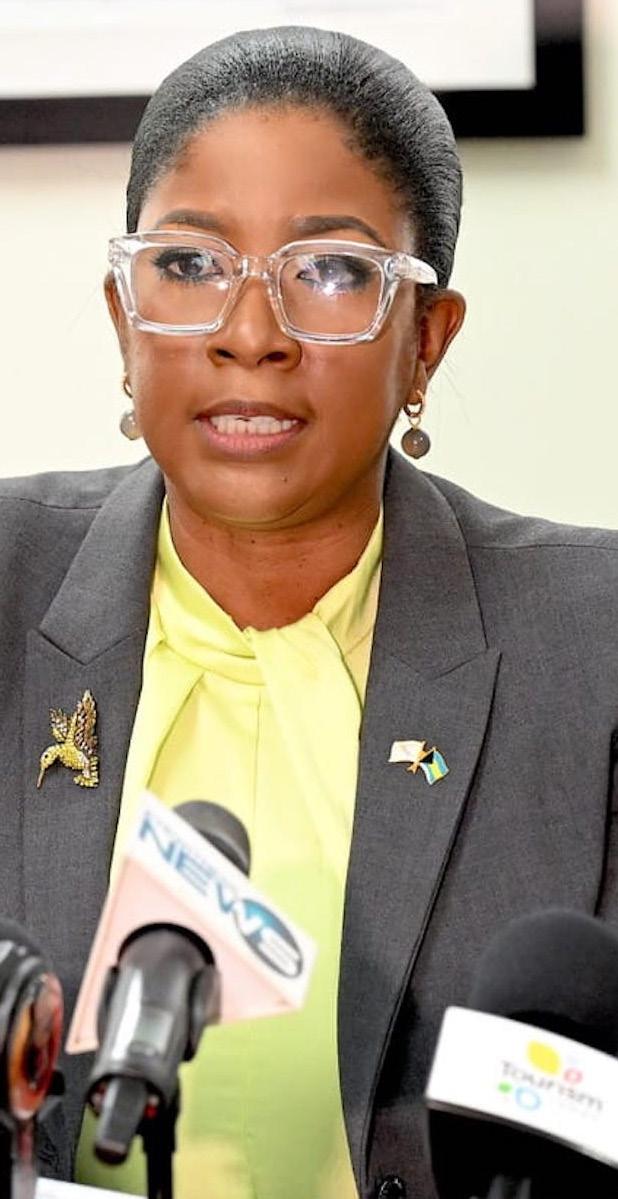

By NEIL HARTNELL Tribune Business Editor
THE Bahamas has received its first-ever financing from the latest multilateral lender it has joined in the form of a $100m loan to aid the National Energy Policy’s implementation.
The Development Bank of Latin America and the Caribbean (CAF), in which The Bahamas became a shareholder in November 2024, yesterday confirmed that its Board of Directors had approved the financing at its Board of Directors meeting in Seville, Spain.
The terms and conditions, apart from the dollar amount, were not disclosed by CAF, which said: “The approved resources will support the Government of The Bahamas in the implementation of key elements of its National Energy Policy, including strengthening the regulatory framework, modernising infrastructure, promoting renewable energy and improving energy efficiency.
“The operation is aligned with CAF’s green agenda, and will contribute to the country’s efforts to mitigate climate change by transitioning to cleaner and more sustainable energy sources. With this approval, The Bahamas will be able to improve the reliability of its electricity system, reduce generation costs and increase its resilience to climate shocks. The reforms also seek to attract new investments in energy infrastructure.”
Sergio Diaz-Granados, CAF’s executive president, added: “The Bahamas is one of CAF’s newest shareholder countries, and we are proud to approve our first sovereign operation
in support of its national commitments to more sustainable energy. “This approval reflects our commitment to be a reliable partner in the country’s path towards sustainable and inclusive growth. We understand the unique challenges faced by small island states and stand ready to further deepen our collaboration with The Bahamas.”
CAF said the financing “will also strengthen institutional capacities and lay the groundwork for long-term investments in the country’s energy transition”. It added: “The operation will support key objectives outlined in the Bahamas National Energy Policy, including the modernisation and digitisation of the electricity network, enhanced integration of renewable energy sources, improved affordability and strengthened institutional capacity in the energy sector.
“It aims to reduce reliance on fossil fuels, improve energy access and efficiency, and bolster climate resilience, especially for vulnerable island communities.” Jobeth Coleby-Davis, minister of energy and transport, said during the 2025-2026 Budget debate that the initial National Energy Policy - last updated in 2013 - had been rendered “obsolete” by recent developments.
“In less than one year, the ministry produced a draft new National Energy Policy 2025-2030, and conducted public consultations throughout The Bahamas on New Providence, Grand Bahama, Abaco, Eleuthera, Cat Island, Exuma and Inagua. The ministry also hosted focus groups with key industry stakeholders,” the minister said.
“Today, the National Energy Policy is being
gazetted for publication by the end of June - a significant milestone for our country. I am especially proud that this critical policy work was spearheaded by young professionals in the ministry, all under the age of 35. Their dedication, expertise and forward-thinking approach reflect the talent and promise of the next generation of leadership in the energy sector.”
The Policy, which has yet to be finalised, calls for the creation of a Department of Energy. And it sets out targets, such as cutting energy losses from BPL’s grid, known as the transmission and distribution (T&D) system, from the present 15 percent to 10 percent by 2030, while also seeking to “decrease annual system outages due to failures” in the grid by 30 percent come the same year.
Energy efficiency and conservation is also a key focus.
“The Government has been making consistent and sustained efforts to meet its international obligations regarding climate change and energy efficiency, evidenced in part by the identification and execution of energy-saving measures within Government-occupied buildings,” the draft National Energy Policy said.
“In 2023, energy audits were conducted on more than 70 such buildings, assessing their energy use and identifying opportunities for savings. The audit results show the potential for an annual savings exceeding $1m, with some government buildings currently realising such benefits.”
“To date, 25 percent of government buildings’ energy consumption have been audited, and it is a goal of the Government to aggressively audit all

government-occupied buildings by 2026. The Government, through the Ministry of Energy and Transport, is also committed to promoting energy efficiency in Bahamian homes to mitigate cost of living and enhance climate change resilience.”
The National Energy Policy said the Bahamas’ Customs headquarters building on Thompson Boulevard had reported energy savings worth $65,000 in 2023 compared to the prior year as a result of implementing energy efficiency measures.
The draft Policy also reveals that the Cabinet on November 19, 2024, approved the creation of a Department of Energy to give “focused attention” to all issues regarding the industry given its importance to The Bahamas and the country’s economic competitiveness.
“Recognising the very significant role of the energy sector to national growth and development, the Government has established the Department of Energy to bring focused attention to matters concerning the energy sector in The Bahamas,” it confirmed.
“While the Government also recognises and acknowledges URCA’s role, jurisdiction and statutory mandate to regulate the energy sector in The Bahamas, the Department of Energy has been given the clear mandate to lead, oversee and superintend certain key energy sector initiatives.
“The Government expects that the Department of Energy will work closely with the Ministry of Energy and Transport and other energy sector agencies, including URCA, to implement the Government’s National Energy Policy.”
By FAY SIMMONS Tribune Business Reporter jsimmons@tribunemedia.net
AN Abaco hotelier yesterday said resort bookings are still being affected by global geopolitical tensions and tariff-related economic uncertainty even though summer 2025 is matching prior years.
Dr Larry Carroll, managing director and owner of the Sandpiper Inn, confirmed that summer bookings have been at a similar level to previous years including 2024’s record-breaking performance.
Speaking to Tribune Business, Dr Carroll said the slowdown in bookings was expected as travel tends to fall-off during the hurricane season. And, while the
overall numbers are “average”, they are aligned with the season’s trend.
“Things are to be expected for this time of year. Things start to slow down around the start of the hurricane season, so I would say occupancy is where it’s supposed to be right now,” said Dr Carroll. He added that bookings have been “unpredictable” due to rising international pressures.
“Things have been up and down from the beginning of the year. With the unrest and tariffs and everything, it’s very unpredictable. The numbers haven’t been great, but they aren’t bad either. Our bills are still being paid so I’d say things are about average,” said Dr Carroll.
residents say:
‘This is the real hell’
By ANNELIA NIXON Tribune Business Reporter anixon@tribunemedia.net
HARBOUR Island residents yesterday asserted that “this is the real hell” as they battled another day of constant Bahamas Power & Light (BPL) outages. Miriam Percentie, recalling multiple promises that the electricity woes would be solved by now, said she returned home from work after 5pm to find there was no BPL power. This was despite a planned system outage supposed to have been over at 11am.
“Most persons are under the impression that the protest was in vain,” she said, referring to last summer’s demonstration by Harbour Island residents to advocate for better water and power services. “The minister
came on and she said whatever she said, but that was it. That was just rhetoric, because we had a little relief after that, but we’re back to the same nonsense.
“Like I said, we had the protest and like, that was only it for the moment, photo ops and whatever else, and that was it. You see the minister came on. I don’t know what the hell she was talking about. They so freaking out of touch.
“Where they living, the lifestyle of the rich and famous, and we suffering on a billion-dollar island where we have multi-million and billionaires who own houses here and come to our shores every year. And they still can’t do nothing better for us,” Ms Percentie added.

“will lose more boats” and economic activity as a result.
Confirming that no changes have been made to the regulations, which also introduce a ‘temporary’ annual cruising permit with effect from today, Mr Maury said: “It’s being implemented as is. It’s still going to be a little confusing I think. Some of the things that we thought are not going to be available.
“Like the frequent digital cruising card is not available on Click2Clear. The fishing permit and the anchorage fee have to be paid separately, and are not on Click2Clear yet.” Asked whether Customs had provided a date for when it would be possible to apply and pay for these permits online, Mr Maury said the agency had not provided any timelines other than pledging to update the industry when it occurred.
“It’s like the portal,” he added, referring to the longpromised online site where boaters can pay their Port Department fees. “John Pinder [central and south Abaco MP] talked about it was going to be ready in June, and here we are, July 1, and no portal. It just causes massive confusion.”
Yesterday’s meeting between Customs and the maritime sector came less than 24 hours before they are expected to implement the reforms contained in the regulations. The frequent digital cruising card (FDCC) is targeted at pleasure vessels that frequent The Bahamas, offering a permit
to facilitate “unlimited visits for a period not exceeding two years”. This is conditioned on the vessel obtaining clearance to enter from Customs, and the linking of its registration number to the FDCC. The fees range from $1,500 for a vessel below 50 feet in length, to $2,500 for boats between 50 feet and 100 feet; and $8,000 for vessels exceeding 100 feet in length. Ryan Pinder KC, the attorney general, last week defended the reforms and fee changes as “fair” and “balanced”, adding: “So for this frequent digital cruising card, not exceeding 50 feet is $1,500. Remember, that’s for two years, unlimited entry. That’s all unlimited entry. Those exceeding 50 feet and not exceeding 100 feet, $2,500, and those exceeding 100 feet, $8,000.
“Now those exceeding 100 feet, who are frequent visitors in The Bahamas, are generally those charter boats who base themselves out of The Bahamas. They generally sit here and charter straight out of The Bahamas. The guests fly in and they get on the boat.
“So you now have unlimited visitation in The Bahamas for two years now. Remember these boats, these luxury boats charge up to $10,000 to $15,000, some $20,000 a day, to charter, and we want to charge them $8,000 for two years. Let’s be real.”
Mr Maury, though, said the maritime industry is concerned over the absence of a fee schedule for Customs and Immigration officers
who clear boats into The Bahamas at their port of entry. The Bill states that the ‘temporary’ annual cruising permit fee “shall cover the costs of” attendance, travel and overtime expenses incurred by Customs and Immigration personnel.
However, the ABM chief said it was uncertain whether this covered the second or any further occasions that the same boat entered The Bahamas on its 12-month cruising permit, or if extra Customs and Immigration-related costs will be incurred.
And, while the legislation states that anchorage fees will only apply to “foreign pleasure vessels not mooring at a marina”, Mr Maury said the impression given on yesterday’s conference call was that this levy has “to be paid no matter what” - whether a boat anchors out for just a day, or even if it is docked or moored at a marina.
“This is what we have always asked for. If they just sat down with people in the industry like us, they could have had this stuff all ahead of time and roll it out,” he added. “I find it hard to believe they are putting us through this much harassment.
“The fishing permit is only good for 30 days. You’re 45 feet, come in and pay your cruising permit, and you have to pay another fee, which is $100. You have to pay for the fishing permit separately and it is only valid for 30 days.
“The marinas want the boats to stay for longer. If you come in during
November, and base your boat in a marina for the whole winter, come December your fishing permit is up and you have to get another by going to a Customs station. My whole point was, if you’re going to pay for a cruising permit for a year, why not be able to pay for a fishing permit for a year? Make it easy,” Mr Maury continued.
“They said they would look into it. Why not pay it for a year? It’s like all these inconveniences. I don’t get it. It’s designed to frustrate people. They’re going to go: ‘It’s too hard, too complicated, we’re on vacation, so we’re not going to The Bahamas’.
“There were a lot of questions. It’s hard to believe they could mess it up this bad. It’s almost like it’s intentionally difficult. I think we’ll lose more boats. We’ve already lost boats that have said it’s too expensive, they’ll go to the Caribbean and do their charter season there,” the ABM chief added.
“Customs and the Ministry of Finance have seen it because they’ve changed the charter fee, dropping the VAT and making it easier to pay, but it’s still very high. They just don’t make it easy, especially when you can do this stuff online instead of making it so hard..... It’s confusing as it is. It’s hard to believe no one thought this out better. It’s not digital. It’s embarrassing.”
Mr Maury said Customs had informed the industry that all its officers have been trained to implement the new fees and associated
FROM PAGE B1
scheme is no “skewed” towards private providers.
“For the last three years my ministry has been working very diligently on our digital platform,” he explained. “We will start accepting NHI at our public clinics, and that includes service, diagnostics and laboratory. We will implement laboratory and diagnostic services on every Family Island, and in some additional poly clinics on New Providence.
“The reason that is important is a lot of diagnostics and laboratory services will be handled in the public sector, so that will bring revenue. From that revenue we will be able to bring on more NHI patients. What we’re doing, for the first time since the inception of NHI, is bringing the public
clinics on. We’re collecting revenue now.”
Revealing that NHI was never intended to be so dependent on private doctors and other providers to deliver services, Dr Darville added: “It was never supposed to be skewed to the private sector. It was supposed to be both the public and the private sector. For some reason the public sector got left behind.”
Suggesting that this may have been partly due to the public sector clinics falling into “disrepair”, or lacking the necessary healthcare equipment and staff, the minister said: “Now we can fix that. For the first time some of the public clinics will be able to access revenue from NHI.
“The Budget only reflects what we get from the Ministry of Finance. The reality is that when we become
revenue-generating some of that money is going to bring more people into NHI, and expand the programme, because some of that money will come back to the Government.
“Now we’re collecting money in the public sector that will be pumped back into the clinics, increasing registration for NHI and expanding the programme. That’s the strategy we have been working on with new laboratory and diagnostic programmes that will reduce waiting time.”
Dr Darville said his ministry was “very close” to completing the digitisation, and creation, of electronic patient medical records.
“Digitisation in public health is at an advanced stage, and if all goes well before the end of this year we will be rolling out

reforms, but he added: “We’ve all heard that before. We’ll see.”
A key element in the Davis administration’s fiscal strategy has been to avoid imposing new and/or increased taxes and fees on Bahamian families, likely due to the potential fall-out for general election votes. Instead, the increases have fallen heavily on foreign visitors, and not just cruise passengers but, in particular, the private aviation and boating markets.
Boating industry contacts spoken to by Tribune Business said that, while not opposed to ensuring that visiting boats and yachts pay their fair share in taxes, any increases in fees/levies must be reasonable and proportionate in scale, with the industry properly consulted in advance and informed of changes in sufficient time so that they can adjust. Much of the backlash is over lack of notice and consultation.
The Government perceives the private aviation and boating markets as having deep pockets, and the ability to pay more because users are wealthy. However, this newspaper has been told that both sectors are incredibly fickle and, if participants perceive they are being targeted for taxes because they are wealthy, they have the means and transportation to go elsewhere besides The Bahamas.
Meanwhile, the fallout continued yesterday. An article on BoatTest. com warned boaters heading to The Bahamas to “adjust their travel budgets
many digital initiatives,” he added.
Citing improved links with the Public Hospitals Authority’s (PHA) radiology department that will allow “more care” to be provided via the clinics, Dr Darville said: “It’s been a long ride to get the plant in place, all the equipment in place. I have all the digital x-ray equipment in already, and we’re going through the platform for implementation, working to disconnect and replace the analogue e-rays.
He explained that x-ray images could then be sent to the PHA’s radiology department for analysis, with the findings sent back to doctors and patients at the clinic level.
The reform strategy has emerged after it was reported last week that the NHI Authority, which oversees the state-sponsored healthcare initiative that cares for more than 160,000 Bahamians, had again exhausted its Budget allocation and was unable to pay sums owed to physicians and other service providers. Dr Darville yesterday confirmed that those outstanding sums are now being paid.
Christy Butler, the NHI Authority’s managing director and chief executive, in a conciliatory letter acknowledging the impact the scheme’s financial challenges are having on its service providers, attributed the woes to the inability of its “static” $46.2m annual
Budget allocation from the Government to keep up with ever-growing patient numbers, its expansion and rising costs. And she effectively warned providers, and the 160,000 Bahamians cared for under NHI, to brace for potential cut-backs in services and benefits, stating that “additional programme initiatives and efficiencies will be communicated” and discussed before the Government’s new fiscal year starts on July 1. Mrs Butler, in her letter, sought to place the “delayed provider payments” in the context of the challenges caused by NHI’s growth and its unchanged financing that has failed to keep pace with this.
“Over the last few years, the NHI Authority programme has continued to expand with increased beneficiary enrollment, exponential growth in utilisation, particularly for laboratory services, and increased technology fees to accommodate an evolving programme with a demand for NHI Authority facilities and providers throughout the archipelago,” she wrote.
“Despite the programme’s growth and obvious success, funding has remained static. Additionally, NHI has experienced challenges related to regularised financing, which have made meeting our obligations to providers and vendors increasingly difficult.
significantly” to account for the new fees, adding that the new structure and frequent digital cruising card (FDCC) could benefit persons who are regular visitors to this nation.
“These sweeping changes will undoubtedly impact frequent boaters. While the FDCC offers unlimited entries over two years, the substantial upfront cost might deter those who make shorter, less frequent trips. For those who visit The Bahamas multiple times a year, especially on larger vessels, the FDCC could prove to be more cost-effective in the long run despite the initial sticker shock,” it said.
“However, the increased cruising permit fees for shorter stays, the new fishing permit charge, and particularly the overnight anchoring fees will add considerably to the overall cost of a Bahamian boating vacation.”
As to the consequences, the BoatTest.com article warned of “reduced spontaneity” because “boaters may be less inclined to make quick, unplanned trips”. It added that there were also likely to be “shorter stays” because “the new anchoring fees might encourage boaters to stay in marinas more frequently or shorten their overall time in Bahamian waters to mitigate costs”.
Besides the increase in Bahamas travel costs, the article added that there may be a “potential shift in destinations”, warning: “There are concerns within the industry that these increased costs could prompt some boaters to seek alternative cruising destinations.”
Mrs Butler pledged that the Authority “is working tirelessly” to resolve the payments situation, but warned that potential restrictions and cost curbsdescribed as “efficiencies” - are likely to be unveiled and discussed in the coming days. She also urged providers to help it advocate for “proper funding” and timelier payments.
“We have, and will continue, to escalate our requests for adequate and timely funding to meet our obligations and, once received, we will begin processing payments to providers without delay,” she said. “Many of you have inquired about the programme’s future and sustainability. This is an important and relevant question as you plan to participate in the NHI programme.
“As was communicated last year, the NHI Authority Board of Directors approved several programme efficiencies designed to manage resources and improve programme efficiency and value. Additional programme initiatives and efficiencies will be communicated before the new fiscal year begins on July 1, 2025, and further discussed at the upcoming medical director’s meeting.
“These measures are necessary to address the sustainability of the programme.”
“Although there have been previous payment delays, I recognise that this current delay has extended beyond our collective expectations and has put your organisation and operations in uncomfortable positions.”

has sufficient funding as he confirmed that late payments due to doctors and other NHI providers were being made from last week.
The NHI Authority’s move to eliminate previous barriers to both patient and provider access were detailed in a letter dated Friday, June 27, which unveiled changes due to take effect today. For Bahamians, the biggest development is the elimination of the extra 90-day wait before they become enrolled as NHI beneficiaries, which was imposed some 20 months ago in November 2023.
While this will likely benefit healthcare, and Bahamians’ access to it, the NHI Authority’s letter also repeatedly acknowledged the “resource constraints” that the scheme has faced over the past 12 months as well as challenges in attaining “financial sustainability”.
“Despite the programme’s unprecedented growth and potential for further health care transformation, resource constraints were experienced in the 2024-2025 fiscal year,” its directors wrote. “As NHI Authority seeks to ensure the adequate distribution of resources and secure the programme’s financial sustainability, the Board of Directors has approved the following initiatives for fiscal 2025-2026.
Describing the “removal of the 90-day enrollment period”, the NHI Authority said: “Effective July 1, 2025, NHI Authority will revert to the previous standard
processing timelines, allowing beneficiaries to access services in a shorter period post-enrollment. Accommodations will be made for beneficiaries with a current pending enrollment date.”
The 90-day wait was unveiled as part of a package of changes announced in a November 2, 2023, letter that several medical sources - speaking on condition of anonymity - said amounted to “managing the capacity” of the scheme to cover an ever-increasing number of Bahamians and fit this growth into a limited budget.
The extra 90-day enrollment period was added to the existing “standard” time for Bahamians to be onboarded to NHI. This has meant, for example, that someone who enrolled with NHI on or after November 22, 2023, had to wait until April 2024 to fully join. Existing NHI beneficiaries were not impacted.
Meanwhile, the NHI Authority’s letter also revealed that, as of today, the limitations imposed last summer on the size of NHI’s care network, and the number of doctors, laboratories and other medical facilities offering services to patients enrolled in the scheme, are being removed.
Described as the “resumption of provider onboarding”, the NHI Authority said: “The provider network expansion throughout the archipelago will continue to be guided by resource and capacity management considerations. Based on current capacity needs, there will be opportunities for onboarding facilities
FROM PAGE B1
of equipment. And then, of course, we pay duty and shipping and VAT on top of all those to bring them over.
“It would be under a warranty if it were in the US, but they have to send somebody to look at it and all that sort of stuff. I just have to reorder the equipment. That’s the cheapest. Best way to go is to reorder brand new equipment to make that be the case. And it’s not something, of course, that you just go run down to Pigly Wigly and go get a few more. It’s a major order. It takes me three weeks to get stuff in. And I just paid for this.
“It would be awesome if the Government systems worked well together, and we could say: ‘Hey, this was caused by BPL. Can you waive duty and VAT on the next one that I have to replace.’ It’s been 60 days or something like that since I’ve had these bar refrigerators in so that would be awesome. Or a way to make that back, because otherwise I got to pay again the VAT, the duty. I have to eat the shipping either way. But it’d be great if I could get compensation for that, too.”
Mr Rolle said that with BPL outages come water woes and Internet interruptions. He said hotels that did have generators had to take guests from those that did not. The Rock House “have a huge stake” in the success of Harbour Island and have had to explain the outages away to tourists.
“We’ve been trying to control the narrative as best as possible with our guests, obviously, because we have a huge stake in Harbour Island being successful,”
Mr Rolle said. “In terms of the guests coming in, I mean, obviously we would love to vent to them, but all of the hotel operators are the same where we sort of try to brush it off and just let them know that this is something that happens when it’s summer, so on, so forth. Again, just to control the narrative.”
Mr Prosenjak added:
“That’s the hard part because the tourists, they don’t know the struggles that we go through all the time with water and electricity and, thankfully, at the hotel, we have the back-up systems in place to just kind of kick right over.
“So if they’re in their room during the day and
and providers in fiscal 20252026 in New Providence and the Family Islands.”
Dr Sands, though, said the letter’s repeated references to “resource constraints”, and warning that “additional measures” will be taken if necessary to ensure NHI’s sustainability, suggested it is “very clear” that the directors themselves are “quite sceptical about the resources available for this mandate”.
“I don’t know how to interpret that other than to say there appears to be a disconnect between the Board and the political directorate,” he told Tribune Business. “That’s damn the torpedos. We’re going to enroll as many people as possible and provide all the benefits, even though we’re not sure how to pay for it.”
One doctor, speaking on condition of anonymity, agreed with Dr Sands, adding: “More providers and members means more monies to be paid out.”
Tribune Business revealed last week how the NHI Authority had to request extra funding from the Ministry of Finance to cover unpaid bills owed to doctors and other NHI providers after the scheme exhausted its budget for the 2024-2025 fiscal year.
One doctor, speaking on condition of anonymity, said they have now received payment for May 2025 while 50 percent of the sums due for laboratory services for that month have also been disbursed. But Dr Sands added: “If you couldn’t make it work before with the budget you had, and now you’re just going to open everything
they noticed that there was a 30-second power outage, all they see is the clock on the stove top resets to 12 o’clock. They don’t really realise the damage on the infrastructure, or what it takes to keep that downtime to 30 seconds while our generator is firing up and ready to kick on.
“And the personnel, I now need to keep somebody around later in the evening just in case there’s a power outage, and we want to make sure that everything turns on and it comes back up to speed normal. So, I don’t think they really notice. And the bulk of our client base comes from the US, and they’re used to having 100 percent uptime power. So it’s a rarity when they would have a power outage at their house because there’s ample supply for everybody. And no one’s competing over the same kilowatt hours,” he added.
“We should note that BPL has been very proactive with their communication during all of this in the Whats App groups. It’s nice to at least know what is going on and have someone respond with even an educated guess as to when power may be restored. The other night we had to stay on generator for about 14 hours through the night. Being told that would be the case was helpful.”

up, it makes absolutely no sense financially.
“Again, I’m not surprised, not in the slightest bit surprised. They’ve [the Government] got an election to try and win, and figured that blowing a hole in the Public Treasury was the way to do it or creating more ‘red ink’ at the Public Treasury was the way to do it because they have not paid their bills this year.
“Once again it’s voodoo economics and makes absolutely no sense. While it’s important to focus attention on healthcare, this could be financed if a lot of wasteful expenditure was eliminated. Maybe if they cut back on consultancy fees by $50m they could cover the Public Hospitals Authority, NHI and their shortfalls. No. We’re going to continue to spend even more despite the limited addition to the budget. It’s crazy.”
The Davis administration expanded the NHI Authority’s annual funding by $2m in the Budget, increasing it from $46.2m to $48.2m for the 2025-2026 fiscal year - an amount projected to remain the same for the following two fiscal years. For 2024-2025, NHI had used up $36.135m - some 78.2 percent of its full-year $46.2m allocation - by endMarch, which marked the fiscal year’s three-quarter mark.
And the Ministry of Health and Wellness has seen its recurrent (fixedcost) spending budget increased by $22.37m for the upcoming 2025-2026 fiscal year, taking this from $332.747m in 2024-2025 to $355.12m, while the
Public Hospitals Authority (PHA)’s taxpayer subsidy has expanded by $15.4mgrowing from $232.456m in 2024-2025 to $247.856m. This is designed to address such “shortfalls”.
The NHI Authority, meanwhile, said payments to doctors will start after a patient’s first visit to their primary care provider. “As of July 1, 2025, capitation payments will start after the beneficiaries’ first visit to their assigned primary care provider. This will only apply to newly-enrolled and reassigned beneficiaries,” it added.
“Effective July 1, 2025, NHI Authority will introduce credentialing and digitisation fees for newlyonboarded facilities and will implement the same for existing providers in the next calendar year. These fees will support the provider credentialing process and increase the programme’s digital footprint for future evidence-based decisionmaking.” A fee schedule is to be released.
Acknowledging past challenges, the NHI Authority added: “Awareness campaigns will be launched as needed and where applicable to inform beneficiaries, providers, and the public about these new measures....
“The NHI programme continues to grow and expand throughout the archipelago of The Bahamas, aiming to transform primary care delivery on the journey to achieving universal health coverage. During the upcoming fiscal year, NHI will continue to progress crucial programme
BRILAND RESIDENTS SAY:
‘THIS IS THE REAL HELL’
FROM PAGE B3
“BPL and Water and Sewerage promised Harbour Island that these woes are going to be behind us in short order, and we’re still dealing with both of them. I wouldn’t talk about Cable Bahamas, but we can do without cable. But light and water are essential.”
Ms Percentie questioned how a larger island, such as New Providence has more reliable power. “My thing is this,” she added. “This has been going on from I was a little girl during the summer, but it’s worse now because we would expect it; it just seemed normal.
“Come on. It’s 2025. If they sending people to the moon... we can’t have light and water in a tiny metropolis? That’s foolishness. And my thing about it is, like I just said to my general manager, who’s from Nassau, I said: Nassau is 22 by seven, compared to us two miles by half. If Nassau could have power for the most part, with Atlantis and all those other things going
on, you think by now they haven’t come up with a plan so that we can have power on this little island?
“Why we can’t have a resolution. All we have is a bunch of flipping generators that are breaking down every other minute. And whenever they send a part here, it must be an after-market part or something that’s on the way out. I don’t get it,” Ms Percentie added.
“If they could power Nassau, right, why is it such a challenge to power this tiny island? Whether they have to replace all of the generators, whether they have to build solar infrastructure into our power plant, whether they need back-up batteries or generators, or whatever, they need to do something.
“You can imagine we were off, let’s say from 8am to 11am. I come home shortly after 5pm and power is already out. We don’t know what time we can look forward to having power again, whether we
initiatives such as legislative reform, National Prescription Drug Plan integration, healthcare digitisation and the advancement of population health reporting.”
The NHI Authority continued: “The programme’s sustainability is paramount, and the above decisions have been carefully and thoughtfully considered with that mandate in mind.
The NHI Authority Board of Directors and executives are committed to responsible governance and resource allocation.
“Our provider network and the Bahamian public deserve a programme that evolves to address current needs and realities. As we continuously assess the performance of the NHI Authority programme during the fiscal year, if additional measures become necessary we will communicate them directly to you, our valued stakeholders.
“We thank all providers for their patience and partnership, particularly during the 2024-2025 fiscal year. NHI Authority recognises and appreciates the impact that resource constraints have placed on our providers and will continue to advocate for NHI Authority’s sustainable funding,” the letter added.
“NHI Authority will communicate openly and transparently with providers throughout the upcoming fiscal year regarding programme challenges, realities and partnership opportunities. The NHI Authority Board of Directors and executives are working diligently to ensure the longevity and success of the NHI Authority for future generations of Bahamians.”
have to sleep in the heat. We don’t know.
“And they just coming up with these repetitious posts in the chat about this failure, this thing and the next thing. And ‘we working feverishly, and we appreciate, y’all...” Appreciate what? We don’t appreciate the heat and the flipping dark. And I just paid my BPL bill today, because if I don’t pay it, they’ll come to turn me off.
BPL released an advisory that there would be a planned outage from 8am to 11am yesterday “to facilitate critical installation works and equipment checks at the power station”. It later sent out a statement stating “power supply to the Dunmore and Narrows feeders has been interrupted to allow for urgent repairs to one of our units”.
“The Dunmore and Narrows feeders were opened at 4.45pm to facilitate emergency generation repairs at the Harbour Island power station,” BPL said.

Specifically, US departures reduced by 2.8 percent to 600,000 relative to the comparative 2024 period. Contrastingly, non-US departures grew by 0.7 percent to 100,000 compared to a year earlier.”
Turning to the vacation rental market, the Central Bank said: “In the short-term vacation rental market, data provided by AirDNA showed that, in May, total room nights sold rose by 5 percent to 66,830 vis-à-vis the corresponding period in the prior year.
“The average daily room rate (ADR) firmed for entire place listings by 10.4 percent to $571.89 relative to the comparative period of 2024, and by 1.3 percent to $189.16 for hotel comparable listings. However, given the inventory boost, average occupancy rates for entire place listings decreased to 44.1 percent from 47.3 percent a year earlier.

“Likewise, hotel comparable listings declined to 43.5 percent from 47.7 percent in the preceding year. On a year-to-date basis, total room nights sold grew by 10.7 percent and the average daily rates on entire place and hotel comparable listings by 8.6 percent and 3.6 percent, respectively.”
outside of the US, and that will cause them to stay put.
The possibility of a US recession in the second half of 2025 is also another serious factor we must stay alert about.”
During the 2025-2026 Budget debate, Chester Cooper, deputy prime minister, said the tourism sector is bracing for “headwinds” due to US policy changes, including travel advisories, tighter immigration laws and economic uncertainty, begin to impact travel to the Caribbean.
He said the effects are already being felt in future bookings, which show signs of decline and linked the “softening in the tourism travel markets” to geopolitical developments largely beyond The Bahamas’ control.
“Taxes and tariffs beyond our control will likely driveup the cost of living and precipitate uncertainty,” Mr Cooper said. “Much stricter and changing immigration laws will affect Caribbean nationals, who may face challenges when travelling
Mr Cooper referenced economic forecasts from JP Morgan and Goldman Sachs, which project up to a 45 percent chance of a US recession - a scenario that would likely temper discretionary travel. Still, he expressed cautious optimism, pointing to The Bahamas’ close proximity to the US and a trend toward last-minute bookings as advantages. “Our strategies have a short-term reactive component but are also very long-term focused,” Mr Cooper said. “We will continue to have strategic focused marketing.”
From January to April 2025, The Bahamas welcomed 4.3m foreign air and sea arrivals, a significant increase over the 3.9m during the same period last year. That represents an 11.7 percent year-over-year jump and a 65 percent rise from the same period in 2019. Abaco recorded a seven percent increase in arrivals, with air travel up nearly 14 percent.
As for monetary developments, the Central Bank confirmed that excess liquid assets in the Bahamian commercial banking system are now approaching $3.2bn as deposit base growth continues to outstrip monies released for new lending opportunities.
“In particular, excess reserves, a narrow measure of liquidity, grew by $44.1m to $1.965bn, a turnaround from a $32.6m reduction in the previous year. Likewise, excess liquid assets, a broad measure of liquidity, rose by $33.5m to $3.183bn - a shift from a $6.2m decrease
in the preceding year,” the regulator added.
“During the review month, external reserves declined by $24m to $2.803bn, extending the $11.7m fall-off in the prior year. Leading this outcome, the Central Bank’s net foreign currency sales to the public sector widened to $45.1m from $24.7m in the previous year.
“Conversely, the Central Bank’s net purchases from commercial banks advanced to $19.3m from $17.1m in the same period last year. Further, commercial banks’ net foreign currency transactions with their customers shifted to a net intake of $26.6m from a net sale of $34m in the comparative 2024 period,” the Central Bank added.
“Provisional data on foreign currency sales for current account transactions revealed that monthly outflows decreased by $21.2m to $592m in May vis-à-vis the corresponding period in 2024. Of note, reductions were posted for factor income remittances by $24.5m; for travel related
By JOSEPH WILSON and EDITH M. LEDERER Associated Press
LEADERS of many of the world's nations, but not the United States, gathered Monday in Spain to tackle the growing gap between rich and poor nations and try to drum up trillions of dollars needed to close it.
More than 70 world leaders and other delegates unanimously adopted the so-called Seville Commitment — named for the host city — which had previously been hammered out in the run-up to the meet, without changes. It said delegates have agreed to launch "an ambitious package of reforms and actions to close the financing gap with urgency."
The gathering was held while many countries face escalating debt burdens, declining investments, decreasing international aid and increasing trade barriers. Still, there is hope that the world can address one
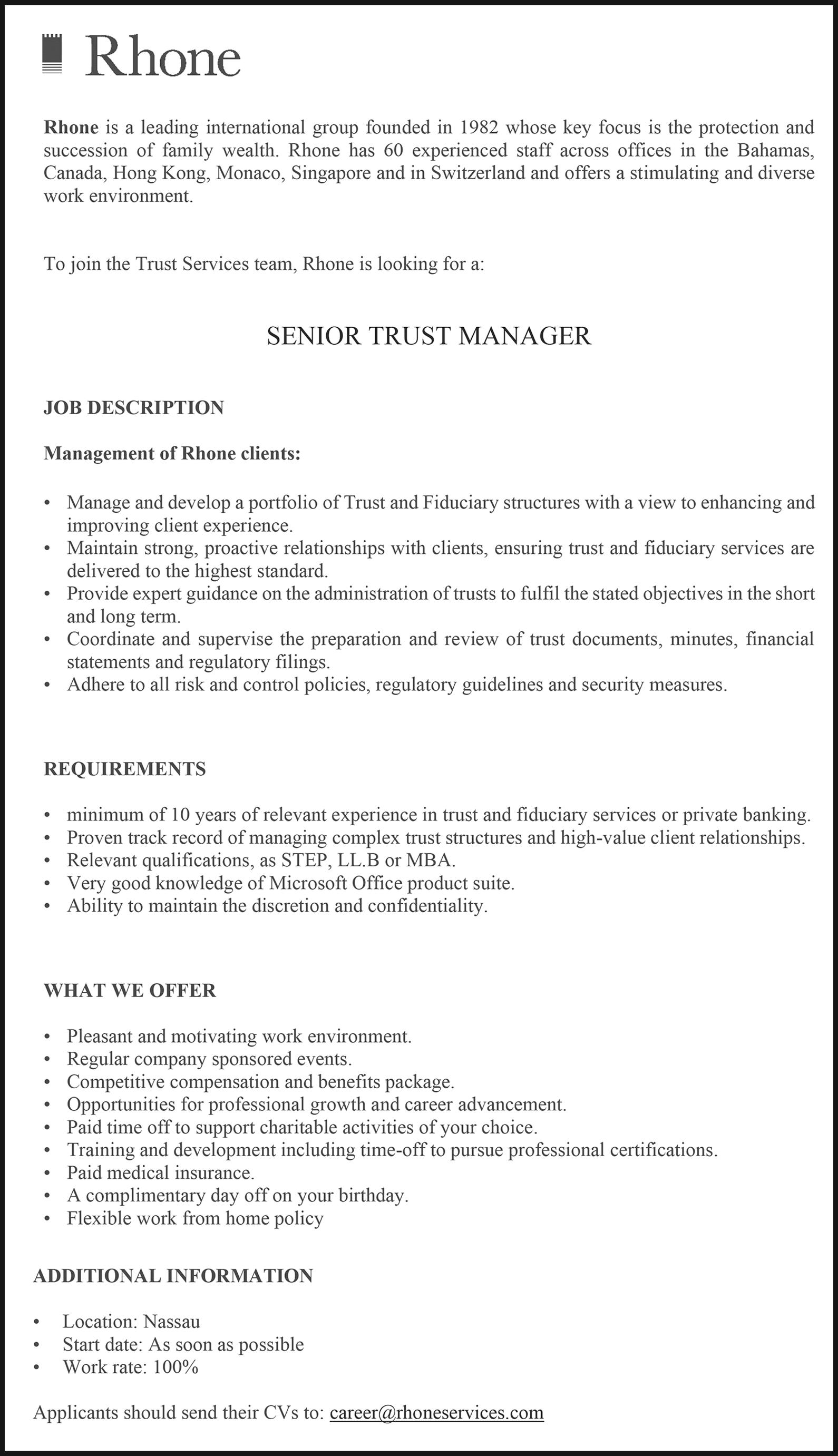
of the most important global challenges: ensuring all people have access to food, health care, education and water.
"Financing is the engine of development. And right now, this engine is sputtering," United Nations Secretary-General Antonio Guterres said in his opening comments at the four-day Financing for Development meeting being co-hosted by the U.N. and Spain.
The hosts said the meeting was an opportunity to close the staggering $4 trillion annual financing gap to promote development, bring millions of people out of poverty and help achieve the U.N.'s badly lagging Sustainable Development Goals for 2030.
Along with heads of state and government, representatives of international financial institutions, development banks, philanthropic organizations, the private sector and civil society also attended.
The summit is an opportunity "for us to raise our voice in the face of those who seek to convince us that rivalry and competition will set the tone for humanity and for its future," Spain's Prime Minister Pedro Sánchez told delegates.
At the last preparatory meeting on June 17, the United States rejected the outcome document that had been negotiated for months by the U.N.'s 193 member nations and announced its withdrawal from the process and the Seville conference.
U.N. Deputy SecretaryGeneral Amina Mohammed last week called the U.S. withdrawal from the conference "unfortunate," adding that after Seville, "we will engage again with the U.S. and hope that we can make the case that they be part of the success of pulling millions of people out of poverty."
The European Union and France also said they were not going be dissuaded by the American-led trend toward unilateralism.
"Collective mobilization can still work," French President Emmanuel Macron said on Monday.
European Commission President Ursula von der Leyen reaffirmed the bloc's commitment to development financing, saying, "Our commitment is here to stay."
The Sevilla Commitment calls for a minimum tax revenue of 15% of a country's gross domestic product to increase government
expenses by $4.3m; and for oil imports by $1.2m.
“In contrast, transfer payments increased by $4.1m, while non-oil imports grew by $3.3m. Similarly, payments related to ‘other current items’, primarily credit and debit card transactions, rose by $1.4m.” Examining the extension of credit, the Central Bank said: “In May, the growth in total Bahamian dollar credit strengthened to $93.2m from $73.9m in the previous year. Underlying this outturn, net claims on the Government expanded by $83.3m, surpassing the $12.9m accumulation last year. In addition, private sector credit growth extended to $13m from $11.1m a year earlier.
“Of note, commercial loans increased by $1.9m, a switch from a $3.9m fall-off in the prior year. Meanwhile, the rise in consumer credit moderated slightly to $8.8m from $9.2m in the preceding year. Further, mortgages rose by $2.3m, a slowdown from a $5.9m uptick the year prior. Conversely, credit to the rest of the public sector decreased by $3.1m, a shift from a $49.9m accumulation in the previous year.”
resources, a tripling of lending by multilateral development banks and scaling up of private financing by providing incentives for investing in critical areas like infrastructure. It also calls for reforms to help countries deal with rising debt.
U.N. trade chief Rebeca Grynspan recently said "development is going backward" and the global debt crisis has worsened.
Last year, 3.3 billion people were living in countries that pay more interest on their debts than they spend on health or education, and the number will increase to 3.4 billion people this year, according to Grynspan. And developing countries will pay $947 billion to service debts this year, up from $847 billion last year.
Angolan President Joao Lourenco, speaking for the African Group, said debt payments "consumes more resources than those allocated to health and education combined" for many countries.
Jonathan Shrier, acting U.S. Representative to the Economic and Social Council, told the June 17 meeting that "our commitment to international cooperation and long-term economic development remains steadfast." He said the text "crosses many of our red lines."

By LISA MASCARO, KEVIN FREKING and JOEY CAPPELLETTI Associated Press
SENATORS hunkered down Monday to consider proposed amendments to President Donald Trump's big bill of tax breaks and spending cuts amid challenges including the weekend announcement from one GOP senator that he won't run for reelection after opposing the package over its Medicaid health care cuts.
The grind is expected to take all day, and it could churn into the night. Potential changes were being considered in what's called a vote-a-rama, though most are expected to fail. With Democrats united against the Republican president's legislation and eagerly lined up to challenge it.
"It's time to vote," said Senate Majority Leader John Thune of South Dakota, as the chamber opened. But later he suggested final action could slip.
Senate Democratic Leader Chuck Schumer of New York said the "hardest choices" for Republicans are still to come. Democrats, he said, are bringing "amendment after amendment after amendment to the floor, so Republicans can defend their billionaire tax cuts and so they can try to explain their massive cuts to Medicaid to people back home."
The day will be pivotal for the Republicans, who have control of Congress and are racing against Trump's July Fourth deadline to wrap up work. The 940-page "One Big Beautiful Bill Act," as it's formally titled, has consumed Congress as its shared priority with the president, with no room politically to fail, even as not all Republicans are on board.
House Speaker Mike Johnson of Louisiana was calling lawmakers back Wednesday for final votes, if it clears the Senate.
A new analysis from the nonpartisan Congressional Budget Office found 11.8 million more Americans would become uninsured by 2034 if the bill became law. The CBO said the package would increase the deficit by nearly $3.3 trillion over the decade.
The White House said it was counting on Republican lawmakers to "get the job done."
"Republicans need to stay tough and unified during the home stretch," White House press secretary Karoline Leavitt said.
But the outcome remains uncertain.
As the first few Senate amendments came up Monday — to strike parts of the bill that would limit Medicaid funds to rural hospitals or shift the costs of food stamps benefits to the states — some were winning support from a few Republicans.
Sen. Susan Collins, R-Maine, joined Democrats on the rural hospitals amendment, and Sen. Lisa Murkowski, R-Alaska, joined Democrats on both votes.
But none of the amendments won majority support to substantially change the package.
Senators to watch Few Republicans appear fully satisfied as the final
package emerges. GOP Sen. Thom Tillis of North Carolina, who announced Sunday he would not seek reelection after Trump badgered him over his opposition to the package, said he has the same goals as Trump: cutting taxes and spending.
But Tillis said this package is a betrayal of the president's promises not to kick people off health care, especially if rural hospitals close.
At the same time, some loosely aligned conservative Senate Republicans — Rick Scott of Florida, Mike Lee of Utah, Ron Johnson of Wisconsin and Cynthia Lummis of Wyoming — have prosed steeper cuts, particularly to health care, drawing their own warning from Trump not to go "crazy."
Sen. Mike Crapo, the GOP chairman of the Finance Committee dismissed the dire predictions of health care cuts as Democrats trafficking in what he called the "politics of fear."
What's in the big bill
All told, the Senate bill includes $4.5 trillion in tax cuts, according to the latest CBO analysis, making permanent Trump's 2017 rates, which would expire at the end of the year if Congress fails to act, while adding the new ones he campaigned on, including no taxes on tips.
The Senate package would roll back billions of dollars in green energy tax credits that Democrats warn will wipe out wind and solar investments nationwide and impose $1.2 trillion in cuts, largely to Medicaid and food stamps, by imposing work requirements, making sign-up eligibility more stringent and changing federal reimbursements to states.
Additionally, the bill would provide a $350 billion infusion for border and national security, including for deportations, some of it paid for with new fees charged to immigrants.
Democrats ready to fight
Unable to stop the march toward passage, the Democrats as the minority party in Congress are using the tools at their disposal to delay and drag out the process.
Democrats forced a full reading of the text, which took 16 hours, and now are filing dozens of amendments.
Sen. Patty Murray of Washington, the ranking Democrat on the Appropriations Committee, raised particular concern about the accounting method being used by the Republicans, which says the tax breaks from Trump's first term are now "current policy" and the cost of extending them should not be counted toward deficits.
"In my 33 years here in the United States Senate, things have never — never — worked this way," said Murray, the longest-serving Democrat on the Budget Committee.
She said that kind of "magic math" won't fly with Americans trying to balance their own household books. "Go back home," she said, "and try that game with your constituents."
The Tribune wants to hear from people who are making news in their neighbourhoods. Perhaps you are raising funds for a good cause, campaigning for improvements in the area or have won an award. If so, call us on 322-1986 and share your story.

By STAN CHOE AP Business Writer
THE U.S. stock market added to its record on Monday as Wall Street closed out a second straight winning month.
The S&P 500 rose 0.5% in its first trading after completing a stunning recovery from its springtime sell-off of roughly 20%. The Dow Jones Industrial Average added 275 points, or 0.6%, and the Nasdaq composite gained 0.5%.
Stocks got a boost after Canada said it's rescinding a planned tax on U.S. technology firms and resuming talks on trade with the United States. On Friday, U.S. President Donald Trump had said he was suspending talks with Canada because of his anger with the tax, which he called "a direct and blatant attack on our country."
One of the main reasons
U.S. stocks came back so quickly from their springtime swoon has been hope that Trump will reach deals with other countries to lower his stiff proposed tariffs. Otherwise, the fear is that trade wars could stifle the economy and send inflation higher.
Many of Trump's announced tariffs are currently on pause, and they're scheduled to kick back into effect in a little more than a week.
The U.S. stock market being back at a record high could actually raise the risk of renewed escalations on tariffs, according to strategists at Deutsche Bank led by Parag Thatte and Binky Chadha. They point to the pattern in 2018 and 2019 of rallies for the market prompting escalations for tariffs, which then drove the market lower and led to subsequent pullbacks on tariffs, which then sparked rallies again.
"Despite the rhetoric to the contrary, this dynamic looks alive and well," the strategists wrote in a report. "In our view, beyond the market reaction, if negative impacts of tariffs on growth, earnings or inflation start to materialize, we will get further relents."
On Wall Street, Oracle's 4% rise was one of the strongest forces lifting the S&P 500. CEO Safra Catz said the tech giant "is off to a strong start" in its fiscal year and that it signed multiple large cloud services agreements, including one
that could contribute over $30 billion in annual revenue two fiscal years from now.
GMS' stock jumped 11.7% after the supplier of specialty building products said it agreed to sell itself to a Home Depot subsidiary in a deal that would pay $110.00 per share in cash. That would give it a total value of roughly $5.5 billion, including debt.
Less than two weeks ago, another company, QXO, said it was offering to buy GMS for $95.20 per share in cash. After the announcement of the Home Depot bid, QXO's stock rose 3.9%, and Home Depot's stock slipped 0.6%.
Hewlett Packard Enterprise rallied 11.1% and Juniper Networks climbed 8.4% after saying they had reached an agreement with the U.S. Department of Justice that could clear the way for their merger go through, subject to court approval. HPE is trying to buy Juniper in a $14 billion deal.
Bank stocks were also solid after the Federal Reserve said on Friday that they are financially strong enough to survive a downturn in the economy. JPMorgan Chase climbed

1%, and Citigroup gained 0.9%.
All told, the S&P 500 rose 31.88 points to 6,204.95.
The Dow Jones Industrial Average added 275.50 to 44,094.77, and the Nasdaq composite gained 96.27 to 20,369.73.
In the bond market, Treasury yields fell ahead of several major economic reports later in the week.
The highlight will be Thursday's jobs report. It's often the most anticipated economic data of each month, and it will come a day earlier than usual because of Friday's Fourth of July holiday.
The job market has remained relatively steady recently, even in the face of tariffs, but hiring has
slowed. Economists expect Thursday's data to show another step down in overall hiring, down to 115,000 jobs in June from 139,000 in May. Such data has helped keep the Federal Reserve on hold this year when it comes to interest rates.
Fed Chair Jerome Powell has said repeatedly that it's waiting for more data to show how tariffs will affect the economy and inflation before resuming its cuts to interest rates. That's because lower rates can fan inflation higher, along with giving the economy a boost.
Trump, meanwhile, has been pushing for more cuts to rates and for them to happen soon. Two of his appointees to the Fed have
said recently they could consider cutting rates as soon as the Fed's next meeting in less than a month.
The yield on the 10-year Treasury fell to 4.23% from 4.29% late Friday. In stock markets abroad, indexes dipped modestly in Europe following a more mixed finish in Asia.
Stocks fell 0.9% in Hong Kong but rose 0.6% in Shanghai after China reported its factory activity improved slightly in June after Beijing and Washington agreed in May to postpone imposing higher tariffs on each others' exports, though manufacturing remained in contraction.
What's in the latest version of Trump's big bill moving through the Senate
By KEVIN FREKING and LISA MASCARO Associated Press
REPUBLICANS are inching closer to getting their tax and spending cut bill through Congress with a final Senate vote likely late Monday or early Tuesday.
At some 940 pages, the legislation is a sprawling collection of tax breaks, spending cuts and other Republican priorities, including new money for national defense and deportations. President Donald Trump has admonished Republicans, who hold majority power in the House and Senate, to skip their holiday vacations and deliver the bill by the Fourth of July.
Democrats are united against the legislation and were offering scores of amendments to alter it Monday as the Senate slogged through what is known as a vote-arama. Senators can offer an unlimited number of amendments, with each receiving a vote. Once the bill clears the Senate, it would have to pass the House before Trump can sign it into law. Here's the latest on what's in the bill. There could be changes as GOP lawmakers continue to negotiate.
Tax cuts are the priority Republicans say the bill is crucial because there would be a massive tax increase after December when tax breaks from Trump's first term expire. The legislation contains about $4.5 trillion in tax cuts.
The existing tax rates and brackets would become
Responsibilities
permanent under the bill. It temporarily would add new tax breaks that Trump campaigned on: no taxes on tips, overtime pay, the ability to deduct interest payments for some automotive loans, along with a $6,000 deduction for older adults who earn no more than $75,000 a year. It would boost the $2,000 child tax credit to $2,200.
Millions of families at lower income levels would not get the full credit.
A cap on state and local deductions, called SALT, would quadruple to $40,000 for five years. It's a provision important to New York and other high tax states, though the House wanted it to last for 10 years.
There are scores of business-related tax cuts, including allowing businesses to immediately write off 100% of the cost of equipment and research.
The wealthiest households would see a $12,000 increase from the legislation, which would cost the poorest people $1,600 a year, according to the nonpartisan Congressional Budget Office analysis of the House's version.
Middle-income taxpayers would see a tax break of $500 to $1,500, the CBO said.
Money for deportations, a border wall and the Golden Dome
The bill would provide some $350 billion for Trump's border and national security agenda, including $46 billion for the U.S.-Mexico border wall and $45 billion for 100,000 migrant detention facility beds, as he aims to fulfill his promise of the largest mass
• Install, maintain, and repair air conditioning
systems
• Inspect and diagnose issues in AC units
• Perform routine maintenance to ensure system effciency
• Replace or repair damaged components
Qualifcations
• High school diploma or equivalent
• Completion of an accredited HVAC program
• Minimum of 2 years experience in HVAC
or air conditioning systems
• Strong problem-solving and diagnostic
skills
• Good communication and customer
service abilities
• Physical ability to perform manual tasks
and lift heavy equipment
email: eastwestac242@gmail.com
deportation operation in U.S. history.
Money would go for hiring 10,000 new Immigration and Customs Enforcement officers, with $10,000 signing bonuses and a surge of Border Patrol officers, as well. The goal is to deport some 1 million people per year.
The homeland security secretary would have a new $10 billion fund for grants for states that help with federal immigration enforcement and deportation actions.
To help pay for it, immigrants would face various new fees, including when seeking asylum protections.
For the Pentagon, the bill would provide billions for ship building, munitions systems, and quality of life measures for servicemen and women, as well as $25 billion for the development of the Golden Dome missile defense system. The Defense Department would have $1 billion for border security.
How to pay for it? Cuts to Medicaid and other programs
To help partly offset the lost tax revenue and new spending, Republicans aim to cut back on Medicaid and food assistance for the poor.
Republicans argue they are trying to rightsize the safety net programs for the population they were initially designed to serve, mainly pregnant women, the disabled and children, and root out what they describe as waste, fraud and abuse.
The package includes new 80-hour-a-month work requirements for many adults receiving Medicaid and food stamps, including older people up to age 65. Parents of children 14 and older would have to meet the program's work requirements.

By ERIC TUCKER Associated Press
THE Justice Department announced criminal charges Monday in connection with a scheme by North Korea to fund its weapons program through the salaries of remote information technology workers employed unwittingly by U.S. companies.
The charges are part of what law enforcement officials described as a nationwide operation that also resulted in the seizure of financial accounts, websites and laptops that were used to carry out the fraud.
Two separate cases — one filed in Georgia, the other in Massachusetts
NOTICE IS HEREBY GIVEN that an Extraordinary General Meeting of the Shareholders of SGG Management (Bahamas) Ltd. is hereby called to be held at Kaya W.F.G. (Jombi) Mensing 36, Willemstad, Curacao on the 31st day of July 2025 at 10:00 o’clock in the forenoon. The object and purpose of said meeting is to have laid before the Shareholders of the Company the accounts of the Liquidator, Brian Selvadurai, showing the manner in which the winding up of the Company has been conducted and also to hear any explanation that may be given by said Liquidator. Dated the 27th day of June 2025. Brian Selvadurai
LIQUIDATOR of SGG Management (Bahamas) Ltd.
— represent the latest Justice Department effort to confront a persistent threat that officials say generates enormous revenue for the North Korean government and in some cases affords workers access to sensitive and proprietary data from the corporations that hire them. The scheme involves thousands of workers who, armed with stolen or fake identifies of U.S. citizens, are dispatched by the North Korean government to find work as remote IT employees at American companies, including Fortune 500 corporations. Though the companies are duped into believing the workers they had hired were based in the
U.S., many are actually stationed in North Korea or in China and the wages they receive are transferred into accounts controlled by coconspirators affiliated with North Korea, prosecutors say.
"These schemes target and steal from U.S. companies and are designed to evade sanctions and fund the North Korean regime's illicit programs, including its weapons programs," Assistant Attorney General John Eisenberg, the head of the Justice Department's National Security Division, said in a statement. In one case exposed on Monday in federal court in Massachusetts, the Justice Department said it had arrested one U.S. national and charged more than a half dozen Chinese and Taiwanese citizens for their alleged roles in an elaborate fraud that prosecutors say produced at least $5 million in revenue and affected more than 100 companies.
NOTICE
Cerrado Galhardo Ltd.
Incorporated under the International Business Companies Act, 2000 of the Commonwealth of The Bahamas. Registration number 209027 B (In Voluntary Liquidation) Notice is hereby given that the above-named Company is in dissolution, commencing on the 27th day of June A.D. 2025.
Articles of Dissolution have been duly registered by the Registrar. The Liquidator is Mr. Aires Galhardo, whose address is Rua Cdor Bichara Moherdaui 135, Jardim Leonor, CEP: 05614-080, Sao Paulo, SP, Brazil. Any Persons having a Claim against the above-named Company are required on or before the 28th day of July A.D. 2025 to send their names, addresses and particulars of their debts or claims to the Liquidator of the Company, or in default thereof they may be excluded from the benefit of any distribution made before such claim is proved.
Dated this 27th day of June A.D. 2025. AIRES GALHARDO LIQUIDATOR
By DAVID McHUGH AP Business Reporter
THE head of the European Central Bank said inflation has become more unpredictable due to shocks like the COVID-19 pandemic and Russia's invasion of Ukraine — and that policymakers need to take the possibility of such extreme scenarios into account and communicate them to the public as well.
"The world ahead is more uncertain, and that
uncertainty is likely to make inflation more volatile,"
ECB President Christine Lagarde said Monday in a speech opening the central bank's annual conference in Sintra, Portugal. "It's pretty basic but that's the reality." One reason, she said, was that increasingly regular supply disruptions were leading companies to change their prices more frequently, a habit that goes beyond the recent burst of inflation in the U.S. and Europe and "reflects
a structural shift in how firms operate under conditions of permanently higher uncertainty."
The bank's assessment of the economy needs to rely on taking extreme possible scenarios into account as well as the more likely baseline predictions, and it should let the public in on those possible outcomes as well, she said. Lagarde in particular cited the inflation spike that followed Russia's inflation of Ukraine, where a baseline scenario based
on higher energy prices suggest inflation for 2022 of 5.5% - but a worst-case scenario indicated more than 7% inflation, much closer to the final figure of 8%.
Another example was the pandemic, where spending by homebound consumers shifted from services like restaurants to goods such as home exercise equipment.
"Scenario analysis could have helped in illustrating that the range of possible inflation outcomes was unusually wide – and would
By JEFF AMY Associated Press
WHEN two South Korean companies announced a multibilliondollar investment to build solar panel and electric battery factories in northwest Georgia, federal subsidies helped close a deal to diversify the local economy.
The factories promised thousands of new jobs, transforming the manufacturing base in Cartersville, once a cotton mill town before an Anheuser-Busch brewery arrived in the 1990s and a tire plant in 2006.
But now Republicans in Congress want to gut the subsidies for projects across the country in a tax cut bill likely days from final passage. President Donald Trump's signature legislation could harm Cartersville despite it being in overwhelmingly Republican Bartow County, which backed Trump with 75% of the vote all three times he appeared on the ballot.
Both companies say they're continuing their buildout plans. But Steve Taylor, a Republican who is Bartow County's lone elected commissioner, says ending the tax credits would be "a little concerning."
"Those companies came and it gave us a completely different type of industry and manufacturing for our community," Taylor said.
By some measures, no state may have more to lose than Georgia from such cuts in Trump's " Big Beautiful Bill." Top Georgia Republicans have been mostly silent, while Georgia's two Democratic U.S. senators are staunchly opposed.
"A vote for this bill is a vote against Georgia's economy and a vote that will put so much of what we've worked so hard to achieve at risk" U.S. Sen. Jon Ossoff told The Associated Press.
And few towns have more to lose than Cartersville, the Bartow County seat about 35 miles (55 kilometers) northwest of Atlanta. As the county transforms from rural to suburban, leaders foresee an economic boost from the
$5 billion battery factory that Hyundai Motor Group and SK On are building, as well as the $2.3 billion solar panel plant belonging to Qcells, a unit of Hanwha Solutions. Both plants pledge to pay workers an average of $53,000 a year.
Clean energy projects are taking off in Georgia
Georgia's huge inrush of clean energy projects had already begun before 2022, when then-President Joe Biden signed his signature climate law, the Inflation Reduction Act. But if anything, that rush accelerated. The 33 additional projects announced by the end of 2024 were the most nationwide, according to E2, an environmental business group. Exact figures differ, but projects in Georgia top $20 billion, pledging more than 25,000 jobs.
Buyers of Qcells solar panels get a 40% federal tax credit, including a 10% bonus for domestic content, which would go away under the bill. Qcells itself would still get production tax credits for panels it started producing last year in Cartersville. The bill would also tax companies that buy panels or components from some foreign countries including China. That could help Qcells, but wouldn't aid domestic producers as much as the domestic content bonus.
When the 1,900-job plant is complete, it will take refined polysilicon, cast it into ingots and then thinly slice ingots into the wafers that become solar cells. Qcells says controlling its own supply chain will let it work more efficiently. Those additional steps would earn the company additional tax credits. Scott Moskowitz, vice president of market strategy and industry affairs for Qcells, said the company built its first American factory up the road in Dalton during the first Trump administration in response to Trump's protectionist trade policy. Moskowitz argues that a quick curtailment of federal subsidies undercuts Trump's goal of bolstering domestic manufacturing, pushing buyers back to Chinese-controlled producers.
Some local Republicans are expressing alarm, with 16 GOP state legislators imploring Congress in a June 17 letter to preserve tax breaks for solar panels. "We urge you not to weaken the tax credits, as doing so would only harm the manufacturing renaissance in Georgia while creating opportunities for Chinese companies to take over the solar industry," wrote the Georgia lawmakers, led by Republican state Rep. Matthew Gambill of Cartersville.
Some argue it's unfair for Congress to pull the rug out after companies relied on the promise of federal support to invest huge sums.
"I would like to think that from a business perspective that when you have agreements in place that you carry those out to fulfillment," Cartersville Mayor Matt Santini said.
High-ranking Georgia Republicans have been publicly silent
Clean energy projects have overwhelmingly located in Republican-held congressional districts, with a report by Atlas Public Policy finding GOP districts host 77% of planned spending.
Republican U.S. Rep. Barry Loudermilk, who lives in Bartow County, addressed the local impact in a Monday statement to the AP, saying the cuts will push Qcells and Hyundai-SK On to become "independent of government subsidies."
"It is important to keep industry as free from government control as possible, and not dependent on government," said Loudermilk, who in May labeled the Biden incentives as "the Democrats' Green New scam."
Republican Gov. Brian Kemp says he's staying out of the debate.

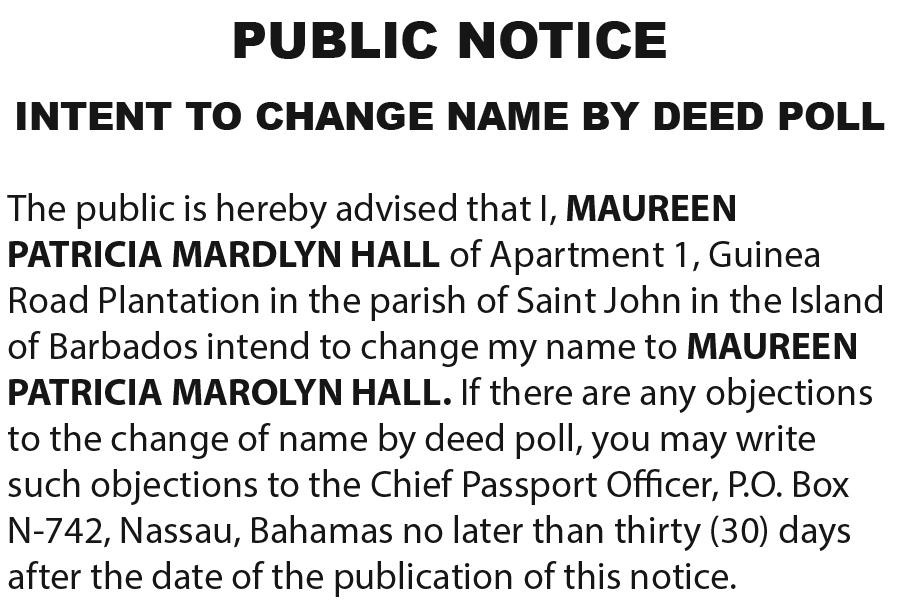

the Minister responsible for Nationality and Citizenship, for Registration Naturalization as a citizen of The Bahamas, and that any person who knows any reason why registration/naturalization should not be granted, should send a written and signed statement of the facts within twenty-eight days from the 24th day of June 2025 to the Minister responsible for nationality and Citizenship, P.O. Box N-7147, Nassau, New Providence, The Bahamas.
INTENT TO CHANGE NAME BY DEED POLL
The public is hereby advised that I, KISHANNA MARISSA BOWE of the Southern District of the Island of New Providence, one of the Island of the Commonwealth of Bahamas intend to change my name to ROSE BOWE. If there are any objections to the change of name by deed poll, you may write such objections to the Chief Passport Offcer, P.O. Box N-742, Nassau, Bahamas no later than thirty (30) days after the date of the publication of this notice.
have reduced the risk of projecting false certainty to the public," Lagarde said.
The bank's strategy review announced Monday reaffirmed its target of 2% for inflation, a goal it has met for the time being as annual price increases were 1.9% in May. The drop in inflation has let the bank cut its benchmark interest rate from a peak of 4% to 2%.
Threats of higher tariffs from U.S. President
Donald Trump have added to uncertainty about the outlook for growth and inflation. The European Commission and US negotiators are trying to reach agreement on a trade deal ahead of a July 9 deadline. The conference in Sintra is the ECB's equivalent of the U.S. Federal Reserve gathering in Jackson Hole, Wyoming, and gathers top central bankers and economists from around the world. Fed Chair Jerome Powell is to take part in a panel on Tuesday with Lagarde, Bank of England Government Andrew Bailey, Bank of Korea Governor Chang Yong Rhee and Kazuo Ueda, the governor of the Bank of Japan.

By FATIMA HUSSEIN and MATTHEW LEE Associated Press
PRESIDENT Donald Trump signed an executive order on Monday ending U.S. sanctions on Syria, following through on his promise to do so.
White House press secretary Karoline Leavitt said the move was designed to "promote and support the country's path to stability and peace." Sanctions will remain in place on ousted former President Bashar Assad, his top aides and family.
The executive order is meant to "end the country's isolation from the international financial system, setting the stage for global commerce and galvanizing investments from its neighbors in the region, as well as from the United States," Treasury's acting under secretary for terrorism and financial intelligence, Brad Smith, told reporters on a call Monday morning to preview the administration's action.
The White House posted the text of the order on X after the signing, which was not open to the press.
The U.S. granted Syria sweeping exemptions from sanctions in May, which was a first step toward fulfilling the Republican president's pledge to lift a half-century of penalties on a country shattered by 13 years of civil war.
Along with the lifting of economic sanctions, Monday's executive order lifts the national emergency outlined in an executive order issued by former President George W. Bush in response to Syria's occupation of Lebanon and pursuit of weapons of mass destruction and missile programs, Treasury officials said. Five other previous executive orders related to Syria were also lifted.
Sanctions targeting terrorist groups and manufacturers and sellers of the amphetamine-like stimulant Captagon will remain in place.
Trump met with Syria's interim leader, Ahmed alSharaa, in Saudi Arabia in May and told him he would lift sanctions and explore normalizing relations in a major policy shift in relations between the U.S. and Syria.
"This is another promise made and promise kept," Leavitt said Monday.
The European Union has also followed through with lifting nearly all remaining sanctions on Syria. Still, some restrictions remain in place. The U.S. still designates Syria as a state sponsor of terrorism and the group led by alSharaa as a foreign terrorist organization.
A State Department official said the department is reviewing those designations.

NOTICE is hereby given that NELSON PAUL of Allen Drive, New Providence, Bahamas, is applying to the Minister responsible for Nationality and Citizenship, for registration/ naturalization as a citizen of The Bahamas, and that any person who knows any reason why registration/ naturalization should not be granted, should send a written and signed statement of the facts within twenty-eight days from the 1st day of July, 2025 to the Minister responsible for nationality and Citizenship, P.O. Box N-7147, Nassau, Bahamas.


By DAVID A. LIEB Associated Press
PRESIDENT Donald Trump's big bill to cut taxes and reduce federal spending on some social safety net programs could have large implications for states, but for many it's too late to do much about it this year.
Tuesday marks the start of a new budget year in 46 states. Though some legislatures are still working, most already have adjourned and finalized their spending plans without knowing whether federal funding will be cut and, if so, by how much.
"The ebb and flow of rumors and reality have created great uncertainty and some anxiety in state governments," said David Adkins, executive director of The Council of State Governments.
Several states have taken preemptive steps, setting aside money in reserves or tasking committees to monitor the impact of federal funding reductions. Others are tentatively planning to return in special sessions this year to account for potential funding cuts to joint federal-state programs such as Medicaid and the Supplemental Nutrition Assistance Program, or SNAP. Others will have to wait until their legislatures are back in session next year.
What's at stake for states?
"If there are significant cuts, states wouldn't be able to fully absorb those," said Brian Sigritz, director of state fiscal studies at the National Association of State Budget Officers.
Nationally, the Medicaid health care program
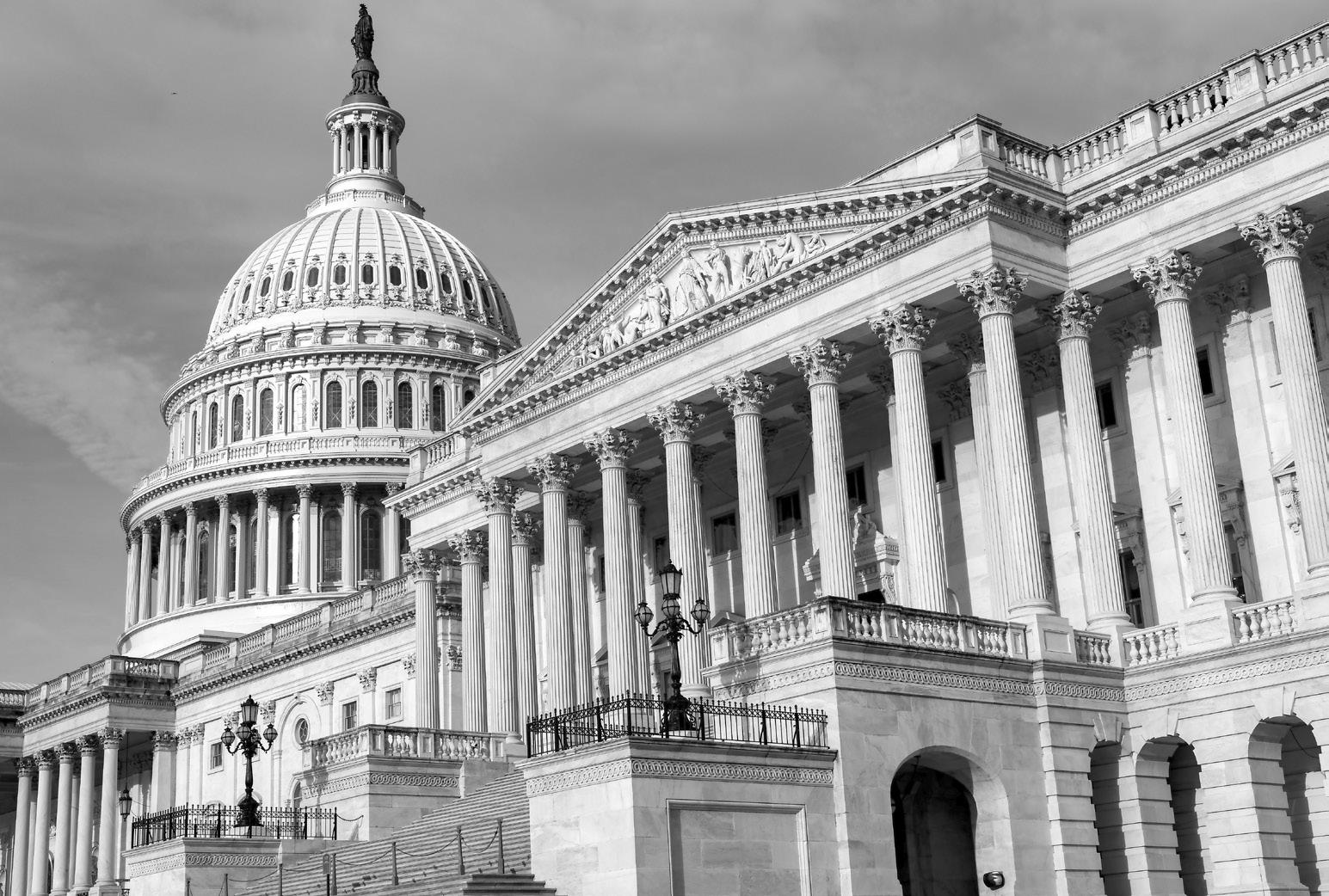
for lower-income residents accounts for 30% of total state expenditures, according to the health policy research organization KFF. That makes it the costliest program in many states, ahead of even K-12 education. The bulk of Medicaid money comes from the federal government, meaning any changes in federal policy can create big ripples for states. Legislation pending in Congress would affect Medicaid in several ways. New work requirements are expected to reduce enrollment by millions of people, while other proposed changes also could reduce federal payments to states. Until now the federal government also has covered the full cost of SNAP benefits and half the administrative costs. Trump's bill would shift more of those costs to states, leaving them to either divert money from other purposes or trim
back their food assistance programs.
The Medicaid and SNAP changes are just the latest in a series of Trump policies affecting state finances, including the rollback of grants for transportation and high-speed internet projects and attempts to withhold federal funds from sanctuary jurisdictions that limit cooperation with federal immigration authorities.
Some legislatures are stocking up on savings
A surge in federal aid and state tax revenue during the coronavirus pandemic led to booming budgets and historic cash surpluses in many states. As revenues slow and those surpluses get spent, some states now are trying to guard against federal funding reductions.
New Mexico enacted a law this year creating a Medicaid trust fund gradually stocked with up to $2
billion that can be tapped to prop up the program if federal funding cuts would otherwise cause a reduction in coverage or benefits.
Hawaii lawmakers, in crafting the state's budget, left an extra $200 million in the general fund as a contingency against federal funding uncertainty. They plan to return for a special session.
And Vermont's budget sets aside up to $110 million in case federal funding is cut. That includes $50 million that can be spent while the Legislature is not in session and up to $60 million that could be appropriated in the future to address federal funding shortfalls.
Though not necessarily tied to federal cuts, Florida lawmakers approved a proposed constitutional amendment that would set aside $750 million a year — or an amount equal to up to 25% of the state's general revenue, whichever is less
By FATIMA HUSSEIN and MATTHEW LEE Associated Press
PRESIDENT Donald Trump signed an executive
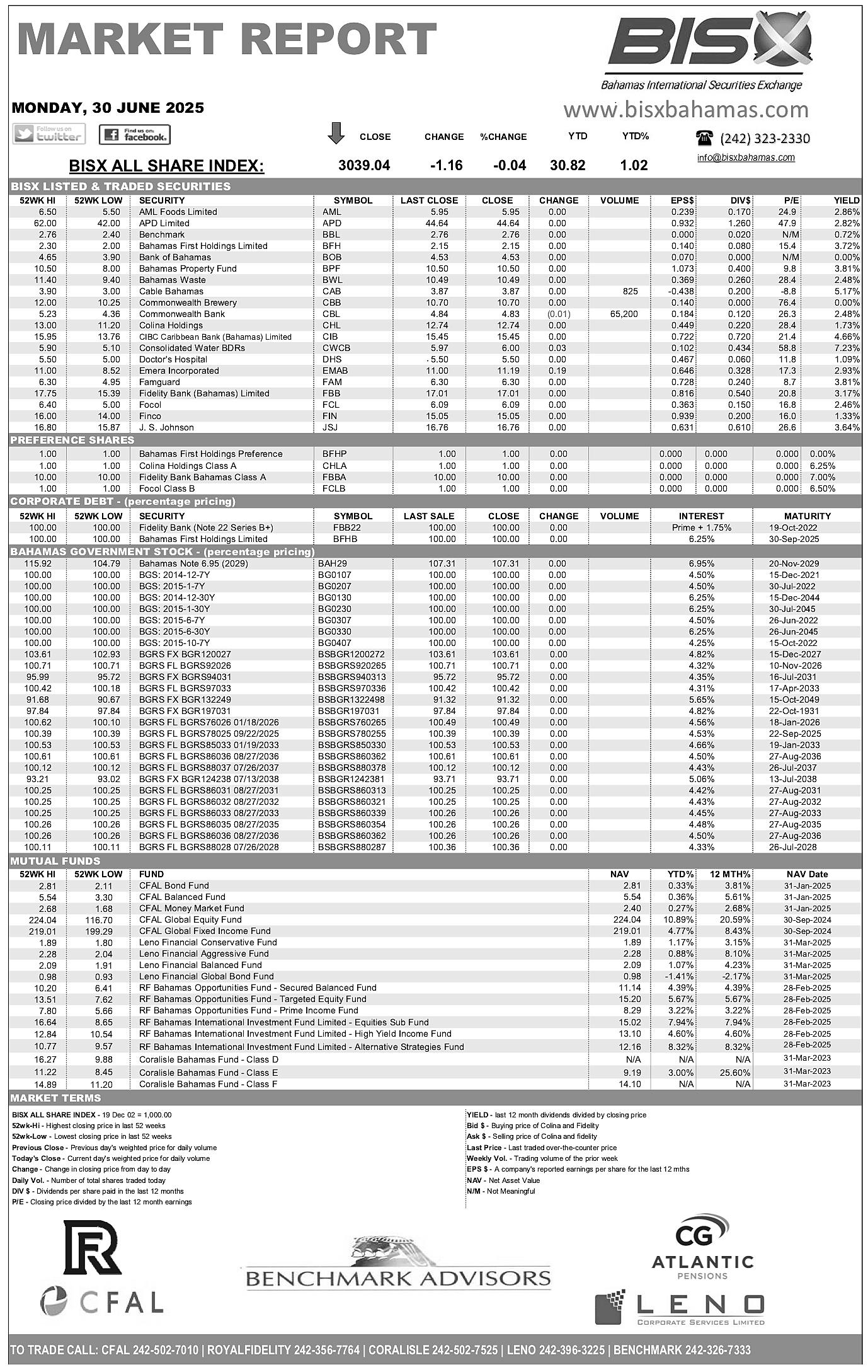
push to advance President Donald Trump’s big tax breaks and spending cuts package. Photo:J. Scott Applewhite/AP
— in a reserve fund that lawmakers could use for emergencies. That measure still must go before voters.
Some governors are cutting back on spending
Because of legislative deadlines, some state lawmakers had to craft budgets well before the details of Trump's bill took shape.
Virginia lawmakers passed a budget in February for their fiscal year that starts Tuesday. Republican Gov. Glenn Youngkin announced several dozen line-item vetoes in May with the goal of creating a roughly $900 million financial cushion.
"There are some shortterm risks as President Trump resets both fiscal spending in Washington and trade policies that require us to be prudent and not spend all of the projected surplus before we bank it," Youngkin said in a statement.
Republican Missouri Gov. Mike Kehoe on Monday vetoed or froze about $500 million of general fund budget items, citing a need "to rein in unsustainable spending" and guard against a projected future shortfall.
Other states also have left money unspent, even though it has not always been touted as a buffer against federal cuts.
States are "enacting really cautious budgets, knowing that they may have to kind of revise them in special sessions or address changes in next year's sessions," said Erica MacKellar, a fiscal affairs program principal at
order on Monday ending U.S. sanctions on Syria, following through on his promise to do so. White House press secretary Karoline Leavitt said the move was designed to "promote and support the country's path to stability and peace." Sanctions will remain in place on ousted former President Bashar Assad, his top aides and family. The executive order is meant to "end the country's isolation from the international financial system, setting the stage for global commerce and galvanizing investments from its neighbors in the region, as well as from the United States," Treasury's acting under secretary for terrorism and financial intelligence, Brad Smith, told reporters on a call Monday morning to preview the administration's action.
The White House posted the text of the order on X after the signing, which was not open to the press.
The U.S. granted Syria sweeping exemptions from sanctions in May, which was
the National Conference of State Legislatures.
Some are taking a waitand-see approach
Before adjourning their sessions, some state legislatures established procedures to monitor federal funding cuts and recommend budgetary changes.
Montana's budget includes $50,000 for an analysis of the financial implications of federal actions, but that spending kicks in only upon the cancellation of at least $50 million of previously approved federal funding or the anticipated loss of at least $100 million of future revenue.
If federal funding to Maryland decreases by at least $1 billion, a provision approved by lawmakers requires the state budget office to submit a report to the General Assembly with proposed actions and potential spending reductions.
The spending plan passed by Connecticut lawmakers also requires the state budget office to respond quickly to federal reductions by identifying state funds that could be used to preserve programs, particularly those providing health care, food assistance, education and other priorities.
North Dakota lawmakers left room for more work. They adjourned their biennial session six days shy of their 80-day limit, allowing time to reconvene if needed.
a first step toward fulfilling the Republican president's pledge to lift a half-century of penalties on a country shattered by 13 years of civil war. Along with the lifting of economic sanctions, Monday's executive order lifts the national emergency outlined in an executive order issued by former President George W. Bush in response to Syria's occupation of Lebanon and pursuit of weapons of mass destruction and missile programs, Treasury officials said. Five other previous executive orders related to Syria were also lifted.
Sanctions targeting terrorist groups and manufacturers and sellers of the amphetamine-like stimulant Captagon will remain in place.
Trump met with Syria's interim leader, Ahmed alSharaa, in Saudi Arabia in May and told him he would lift sanctions and explore normalizing relations in a major policy shift in relations between the U.S. and Syria.
